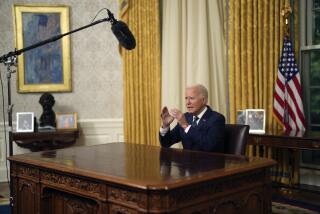‘Hate can have no safe harbor in America,’ Biden says in Atlanta after spa killings

ATLANTA — President Biden said Friday the country must unite to fight discrimination and attacks against Asian Americans, delivering a message of solidarity after killings at three spas here earlier this week.
“Our silence is complicity,” he said after private meetings with Atlanta-area figures. “We cannot be complicit. We have to speak out.”
Eight people were killed Tuesday night — six of them women of Asian descent — and a 21-year-old white man was arrested. Neither police nor the FBI have described the shootings as a hate crime, and authorities say the investigation is ongoing. Biden avoided the legally freighted phrase, but he left no doubt that he believed racial bias played a role.
“We must change our hearts,” Biden said. “Hate can have no safe harbor in America. It must stop. It’s on all of us together to make us stop.”
Biden’s trip here was previously planned to promote $1.9 trillion in newly approved COVID-19 relief, but it was repurposed to connect with, and give comfort to, the state’s grieving Asian American communities. Instead of holding a car rally with supporters as previously planned, Biden met privately with local politicians and community leaders before speaking at Emory University.
Vice President Kamala Harris met up with Biden in Atlanta — their first joint appearance on the road since taking office — and spoke briefly before him.
“Everyone has the right to go to work, to go to school, to walk down the street, and be safe,” said Harris, who is the first Black and South Asian person to hold her position. “And also the right to be recognized as an American, not as the ‘other,’ not as ‘them,’ but as us.”
Sam Park, one of five Asian American state lawmakers who met with Biden, said “the fear is palpable” after Tuesday’s shootings. He said that people tell him, “It could be me next.”
Asian Americans were already struggling with a wave of harassment and assaults in the year since the coronavirus began spreading from China, and the shootings ratcheted up concerns across the country. Former President Trump for the last year described the pandemic as the “China virus,” a term he used again this week during an interview on Fox News, and he repeatedly dismissed criticism that his rhetoric was racist and potentially dangerous.
Biden and Harris did not mention Trump by name in their public remarks on Friday, but they left no question to whom they were referring.
In an allusion to Trump’s “China virus” rhetoric, Biden said, “It’s the coronavirus. Full stop.”
Biden began denouncing hate crimes against Asian Americans before the shootings, most notably last week during a prime-time speech marking one year since COVID-19 was declared a pandemic.
“At this very moment, so many of them — our fellow Americans — they’re on the front lines of this pandemic, trying to save lives, and still — still — they are forced to live in fear for their lives just walking down streets in America,” Biden said then. “It’s wrong, it’s un-American, and it must stop.”
Park, a Democrat, said in an interview before the president’s arrival that he appreciated how quickly Biden’s team reached out after the shootings. The following morning, he got a call from Cedric Richmond, the former congressman who leads the White House Office of Public Engagement, to offer condolences and support. Soon after, he learned that Biden was dropping plans for a political event in Georgia and arranging meetings with Asian American leaders.
After meeting with Biden and Harris, Park said in a text message exchange that the two leaders “heard the heartbreak, fear, and anger of the Asian American community and shared our pain.” He added, “Their commitment to continue to fight for all of us gave me hope. They reminded us that we are all in this together, that we are not alone, and that together we will overcome.”
Another meeting participant, Bianca Jyotishi, the Georgia organizing manager for the National Asian Pacific American Women’s Forum, said later, “Asian American women have been the targets of racialized misogyny long before the backlash to COVID-19, and we need a response that tackles the systemic racism and white supremacy that continues to plague our nation.”
The outreach has important political ramifications. Democrats hope to solidify their gains in Georgia after Biden’s unexpected victory in the state, and the party’s capture of both Senate seats. Asian Americans are an increasingly influential political force here. Twice as many Asian Americans cast ballots in 2020 compared with 2016.
“If we didn’t see that surge in turnout, we likely would not have seen Biden win the state,” said Bernard Fraga, a political science professor at Emory University. Nor perhaps would Sens. Jon Ossoff and Raphael Warnock have ousted two Republicans in the runoff elections in January, handing Democrats control of the Senate.
Biden drew a direct line between the runoffs and the $1,400-per-person relief payments that are flowing to households around the country after the passage of the $1.9-trillion American Rescue Plan.
“If anyone ever wondered if voting can change a country, Georgia just showed that you can,” he said.
Biden met with Ossoff and Warnock after his public remarks, and then visited with Stacey Abrams, the Democratic activist and former Georgia state lawmaker, to discuss voting rights.
Republicans in state capitals around the country are pushing new restrictions on voting, fueled by Trump’s baseless allegations that his loss was caused by fraud.
“The president intends to take an active role in voting rights, not just in Washington, but also in states,” Karine Jean-Pierre, deputy press secretary, told reporters on Air Force One. “I think that meeting is an example of his commitment to making sure that happens.”
Before his meetings, Biden stopped at the Centers for Disease Control and Prevention, which is headquartered in Atlanta, to thank officials for their work on the pandemic.
“We owe you a gigantic debt of gratitude, and we will for a long, long, long time,” he said. “Because I hope this is the beginning of the end of not paying attention to what’s going to come again and again and again. We can build all the walls we want, we can have the most powerful armies in the world, but we cannot stop these viruses, other than be aware of where they are and move quickly on them when we find them.”
More to Read
Get the L.A. Times Politics newsletter
Deeply reported insights into legislation, politics and policy from Sacramento, Washington and beyond. In your inbox three times per week.
You may occasionally receive promotional content from the Los Angeles Times.











